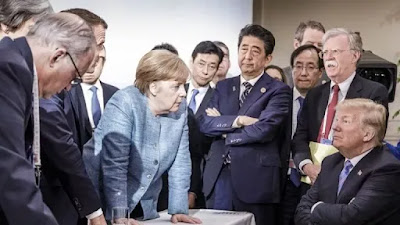Filenews 21 September 2023 - by Marc Champion
German Foreign Minister Annalena Baerbock says Europe will be better prepared for a possible second U.S. presidential term than how unprepared it was in the face of the "absolute shock" of the first. If only it were true. The reality is that no one except the former U.S. president and his supporters will be ready for the second round if it comes.
Baerbock belongs to Germany's Green party and is liberal in every respect, so she had just the right instincts on her visit to the US. Instead of staying in her comfort zone, visiting more or less like-minded Democrats and Biden administration officials, she jumped into the lion's den of the MAGA movement in Texas, meeting, among others, with the state's governor, Greg Abbott.
It is hard to imagine this debate. Abbott has supported a ban on abortion and same-sex marriage, opposed gun control and promoted investment in fossil fuels over renewable energy. It is also against the Biden administration's policy of funding Ukraine's defense, which, according to Abbott, comes at the expense of U.S. domestic needs.
Revolution
So Baerbock deserves a lot of credit for trying to figure out what she was going to face. As she correctly pointed out in an interview Sunday with Bloomberg Television, foreign diplomats cannot choose U.S. presidents. Trump currently looks like the frontrunner by a wide margin to at least win the Republican primaries for the presidential nomination and, if he makes it back to the White House, is likely to follow a revolution in U.S. domestic and foreign policy.
However, the shock would be greater than in 2016, because the Trump team would be able to quickly run its political priorities and the impact would be greater – in Europe as well as in the US. Back then, Trump didn't have a team, and he had a few elaborate policies ready for the top job, as no one expected him to win.
It took three years in a four-year term to clean up the last of the so-called "adults in the room" — think former executives like Gary Cohn and Rex Tillerson or military commanders like James "Mad Dogg" Mattis — who, as cabinet members, thwarted the implementation of some of Trump's worst ideas. Even his attempt to steal the 2020 election was unsuccessful.
So while Baerbock is right that, seven years ago, no European even imagined she could sit across from a U.S. president who did not support the North Atlantic Treaty Organization (NATO), the alliance ultimately survived. For every Trump outburst at a NATO summit, there was an American general on hand to offer assurances and guarantees. U.S. military spending in Europe actually peaked at $6.5 billion under Trump in 2019, up from $3.4 billion in 2017, the final year of the Obama administration.
This time, MAGA Republican think tanks and former Trump officials will have spent four years preparing detailed staff lists and policy documents. This includes legislation that would enable them to start the term with a purge of officials "out of line", and this time a cabinet that is unlikely to include "adults" who intervene decisively.
Trump, for whom the line between his personal interests and those of the United States is blurred, will seek retaliation against perceived enemies at home and abroad. Germany stands out among them. Vladimir Putin, again, does not.
Baerbock — and not surprisingly — focused during her trip to the U.S. on the importance of continuing NATO's "life security" policy for Europe and the defense of Ukraine. Germany, he said, has completely restructured its foreign policy since last February to do "the right thing," defending the "victims" of Putin's invasion of Ukraine. He also spoke about how the crisis has demonstrated how essential the transatlantic alliance remains to both sides, as expressed in opposition to an attack whose success would destroy the so-called rules-based international order. All of the above is true, and traditional US Republicans would agree with many of them. Every word, however, is a trigger for a backlash for Trump and his supporters.
Division
Ukraine, in Europe as in the United States, is increasingly becoming a dividing point for domestic politics, with far-right parties arguing that spending to bolster it deprives domestic priorities of resources. The Alternative for Germany (AfD) is now in second place in opinion polls in the country of Baerbock. The grievances these parties feed on are likely to grow stronger between now and the U.S. presidential election in November 2024, as the impact of rising interest rates and rising living costs reduces growth and employment.
Russia's invasion of Ukraine will reshape the image of the European security architecture in the long run. A second Trump administration would also test to the brink of complete destruction the fundamental notion of shared democratic values that underlies the U.S.-Europe alliance, values that are already being tested and would be difficult to survive another four years of MAGA policymaking in the White House.
An isolationist and deeply conservative U.S. White House will likely come, if not in 2024 and if not under Trump, then sometime in the future. To truly prepare for this eventuality, Europe will have to do the difficult things it has talked about but largely failed to do for years, if not decades: develop a real capacity for strategy and a truly common foreign policy; uniform defence procurement to avoid wasting on multiple versions of the same weapon systems; as well as rationalize collective defense spending of $345 billion a year to be able to deploy its forces at scale.
Not only could Europe then provide its own life insurance policy, but it would also become a more attractive ally to even the most sceptical Americans.
